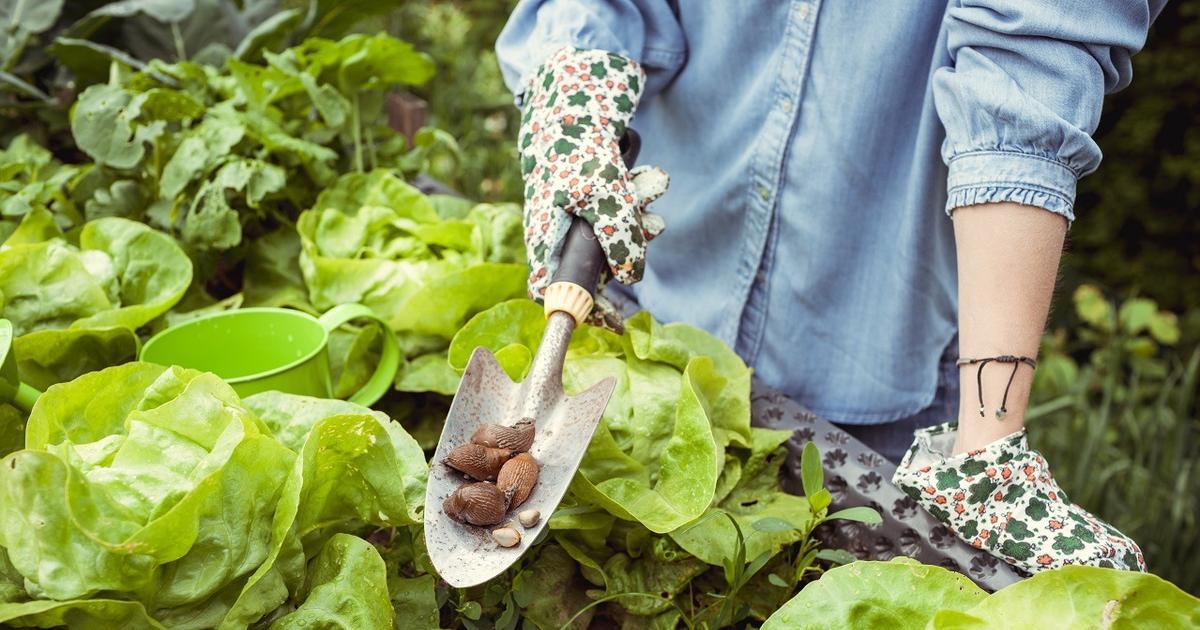Ebersberger Profi: This is how amateur gardeners succeed in fighting the drought
Created: 09/05/2022 09:57
By: Josef Ametsbichler
Lush green: gardener Roland Machate with his digging fork.
He advises more closeness to nature in order to make the home garden more resistant to climate change and long periods of drought.
© PETER KEES
Withered lawn, trees in autumn colors early: The summer of 2022 was dry and hot in the Ebersberger Gardens.
An expert gives tips.
Ebersberg – Roland Machate squats in front of a lavender bush and watches a bumblebee twirling lazily around the blossoms.
"In the long term," he says, "the lawn will lose." The 34-year-old from Ebersberger maintains natural gardens and has set up his own business in this niche as a one-man business.
In a green shirt and gardener's pants, full beard, hair tied back in a short ponytail, he's standing in the middle of one of his showpieces.
In Jacqueline Piltz's crooked garden, only the rattling of the S-Bahn trains sporadically breaking into the Ebersberg train station breaks through the green idyll.
A sprawling, shoulder-high bamboo, in which the birds nest, forms the focal point with a lush thicket of leaves.
It crouches between expansive summer lilac and privet, somewhat more reserved blue rhombus and umpteen small, bird- and insect-friendly shrubs and flowers, surrounded by the ivy-covered, year-round green garden fence.
MAchate is a clear advocate of flowering meadows
The dryness is making things difficult for this classic garden lawn in Steinhöring - unfortunately a common sight at the moment.
© PETER KEES
The strip of manicured, green lawn, which only islands of daisies are allowed to break through, around which Jacqueline Piltz then mows, almost becomes a supporting actor with so much leaf and flower opulence.
It's also the only point on which gardeners Machate and his regular customer have split opinions.
Machate is an advocate of flowering meadows, Piltz loves the well-groomed green.
And accepts that she has to water regularly, more than her three rain barrels can give.
This small difference of opinion does not cloud their enthusiasm for the total work of art.
A flowering meadow that Roland Machate created for one of his customers: drought-resistant.
© Machate/private
In the hot, dry summer of 2022, Piltz's garden is an oasis, barely the size of a soccer field penalty area.
The region is dominated by trees that fall as early as August, scorched ocher lawns and flower beds that droop - if their owners haven't already given up the fight.
Science, there are no longer two opinions, assumes that more and more of these summers are likely to bloom in the Ebersberg district.
Its getting warmer and warmer.
It's getting drier.
Don't become a slave to your own garden
"If you're a gardener, the garden gives you strength," says Jacqueline Piltz (55), here in her green idyll.
© PETER KEES
The classic back garden, as a child would draw it - lawn, framed by flower beds, a few shrubs and then the hedge - is not up to this future.
Machate is convinced of this. Before starting his own business, he studied landscape architecture and worked in the Netherlands, among other places.
Especially if you don't want the plants and therefore the work to get out of hand.
"You can't be the slave of your garden," says the 34-year-old.
Instead of the perfectly manicured golf course lawn, he encourages a meadow of flowers and herbs, made from high-quality seeds, so that the grass does not become overgrown again after a year: "Much nicer and more relaxed!" The garden caretaker can no longer hear the word weed, prefers to talk about weeds.
“We have to get away from this thought: me against the weeds!” he says.
Think through your own garden instead of just planting it
Small, pretty, fragrant: lavender flowers.
© PETER KEES
Better shading and a more varied root system made meadows more resistant to drought.
Depending on the soil, lawns need up to 20 liters of water per square meter, actually every three days.
"Not feasible in the long term," says Machate.
And if you do, then help against drought by letting the grass stand taller.
He advises hobby gardeners who want to get by without the help of a professional to think carefully about their own garden and adapt it to the usage requirements instead of simply planting away.
Perennial native plant species are less labor intensive than annual non-local species.
The garden professional also expects that more and more Mediterranean plants, such as irises, will find their way into local gardens because they are better able to cope with the changing conditions.
Buddleia as a big winner of climate change
The summer lilac flowers purple.
© PETER KEES
On the other hand, flat-rooted plants that have been popular but are too thirsty, such as hydrangea or Japanese maple, would have a hard time.
And: "The thuja hedges will soon disappear from the garden picture," he predicts and looks at a purple flowering bush.
"Buddleia will be one of the big winners from climate change."
A mulch layer made of slowly rotting organic wood chips keeps the moisture in the bed for a long time and also takes care of the weeds, sorry, the weeds, advises the garden keeper.
Small sections instead of large areas prevent dehydration thanks to shadows and wind protection - as with Jacqueline Pilz in Ebersberg.
Machate, who has dubbed his company Roland's Natural Garden Care, says, "A garden can be natural and well-groomed."
Incidentally, the professional is not a blanket enemy of gray in the garden.
"You have to make a clear distinction between rock gardens and gravel gardens," he emphasizes.
While the latter are fleeced deserts, the former could provide space for plant species native to the Alps, for succulents and succulents like the stonecrop, herbs like thyme and lavender, and a place for lizards.
You can read more news from the Ebersberg region here.
By the way: everything from the region is also available in our regular Ebersberg newsletter.







